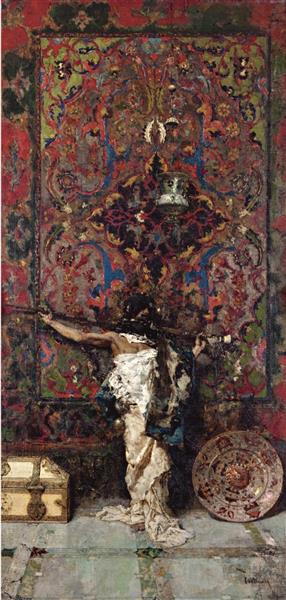Description
The work "Arab in front of a tapestry" by Mariano Fortuny is a clear example of the virtuous mastery of color and light that characterize the artistic production of this Spanish painter, who stood out in the nineteenth century. In this painting, Fortuny shows his fascination with the Arab world, amalgamating his personal style with influences of orientalism, a movement that experienced a great boom in his time.
The composition of the work is remarkable for its balance and the way in which the background of Tapiz becomes a protagonist almost equal to the character who contemplates it. The tapestry, with its rich colors and complex geometric patterns, gives a sense of depth and texture that contrasts with the figure of Arabic, dressed in a robe that also exhibits a palette of warm colors. This use of the tapestry is not merely decorative, but symbolizes the cultural and aesthetic connection between the Arab world and the spectator.
The character who occupies the foreground of painting is an Arab man, whose characteristics have been described as expressive and full of dignity. The face of the model reflects a mixture of introspection and contemplation, as if it were immersed in deep thoughts about its culture and traditions. Fortuny manages to capture subtle nuances in the character's expression, which, although simple in its apparent stillness, emits a strong emotional burden that attracts the viewer's gaze.
Color treatment is one of the most outstanding aspects of this work. Fortuny uses a luminosity that seems to radiate through the different tones he uses, which gives the work an almost palpable visual authenticity. The interaction between the shadows and the lights highlights the folds of the locker room and gives life to the skin of the Arabic, executing a technique that demonstrates its mastery in the management of oil. Such virtuosity not only enriches the representation of the character, but also gives the tapestry of an almost tactile quality.
Fortuny's painting is part of a historical context where the interest in the East revived in the West, and his work adds to a long tradition of artists who sought to capture the essence of foreign cultures. Although "Arabic in front of a tapestry" is placed in this current, Fortuny's approach goes beyond mere imitation, since it introduces a personal perspective and a tangible appreciation by the subject that portrays.
The work can be seen as a bridge between cultures, where the human figure and the tapestry work in a subtle dance of recognition and respect. The contemplative look of the character, his emotions, and the intricate details of the tapestry, invite to reflection on cultural identity and human diversity. Fortuny, through this work, reminds us that art can not only be a visual representation, but also a means to explore and honor the complexities of society and history. In short, "Arabic in front of a tapestry" remains a lasting testimony of Fortuny's ability to merge aesthetics with cultural narrative, achieving a work that resonates even today.
KUADROS ©, a famous paint on your wall.
Hand-made oil painting reproductions, with the quality of professional artists and the distinctive seal of KUADROS ©.
Art reproduction service with satisfaction guarantee. If you are not completely satisfied with the replica of your painting, we refund your money 100%.

